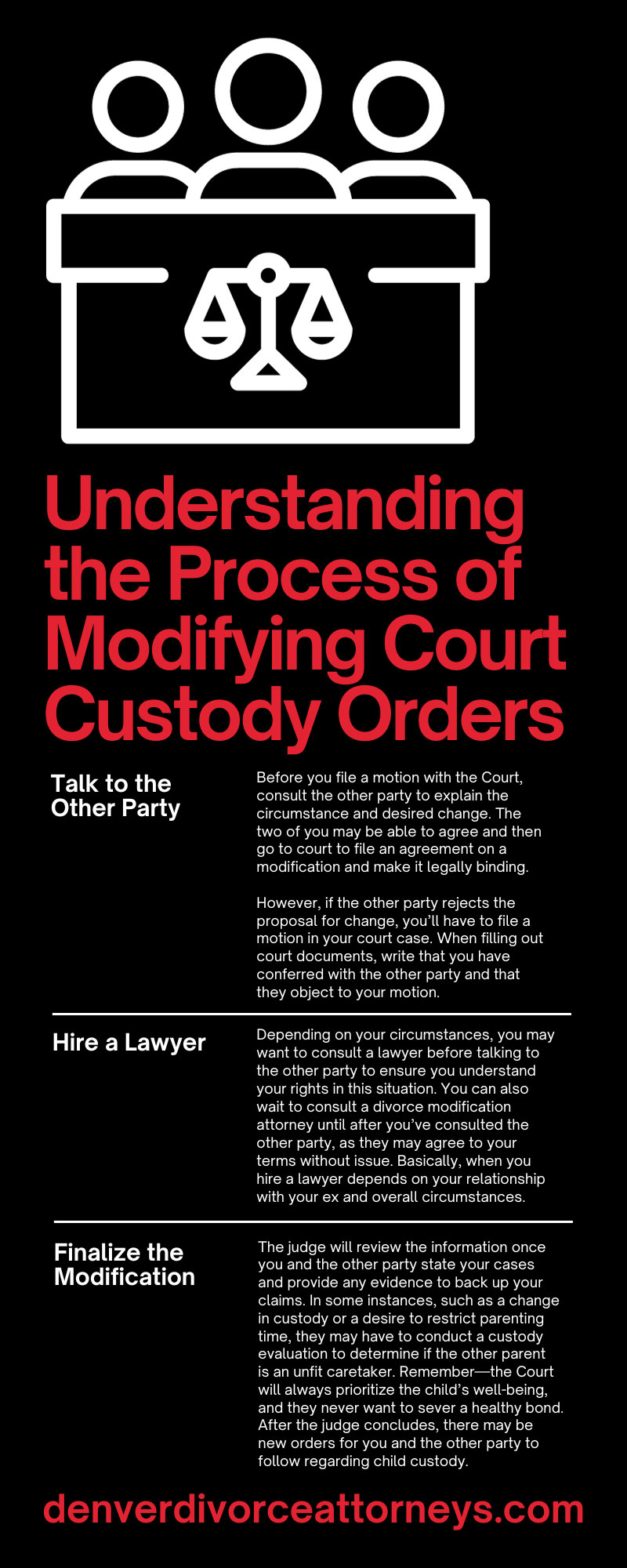Child custody comes with many complexities. During the case, you may come to legal agreements regarding parenting time and child support, and if not, the Court may decide for you. Essentially, the Court either approves your agreements or issues its own orders for you and your ex-partner to follow. Over time, you or your ex-partner may want or need to change the original orders. No matter the reason, you’ll need to file a motion with the Court to alter the current orders in most situations. In this guide, we’ll help you understand the process of modifying court custody orders as you prepare to change yours.
What Are Court Orders?
A court order is a legally binding determination made by a judge. It can be an order based on an agreement you and your ex reached on your own, or it can be based on what the judge decided herself. Court orders are legally binding and occur in a variety of cases, including divorce and child custody.
During a child custody case, the court order can pertain to custody or required child support payments. If both parents have a healthy relationship with the child and are fit for custody, the judge is likely to order 50/50 parenting time or “custody,” depending on the facts of a particular case.
Can You Modify a Court Order Anytime?
Although you can modify most court orders at any time, that is not the case for all types of orders. For example, if you have tried to change majority parenting time and lost the motion, you will have to wait an allotted period before attempting to file again—except in specific circumstances that your lawyer can talk to you about.
For child support payments, you can request modifications as often as you want so long as there has been a “substantial and continuing” change in circumstances that results in a 10 percent increase or decrease in the amount of child support due. For example, you may be able to modify child support if one party gets a new job or if a child is emancipated.
Reasons To Modify Custody Court Orders
You may need to modify your current custody order on many grounds, but the main two involve child support and parenting times. Both reasons can occur under an array of circumstances that we explain in the information below.
Child Support
Either party may request a change in child custody due to their financial situation. The party paying child support may get laid off and cannot cover child support at the currently ordered amount. Alternatively, the primary caregiver could be the one who gets laid off and requires more money in child support to care for their child.
Child support payments could also change if new expenses arise for the child. For instance, if the parents have to put the child in daycare, this new expense may require a modification in current custody payments.
The court determines child custody based on various factors, including number of children, number of overnights, and gross income of each parent. If the child spends only one weekend overnight with a parent once a month, that parent will owe more child support than if they had the child every other week.
Altering Parenting Time
There are many reasons a parent may need to modify child custody. Sometimes, one party files for full custody because they feel the other is unfit to raise the child. Alternatively, one parent’s work schedule may change, making them unable to care for their child at the time they normally would.
You may also need to modify current custody orders if you or the other party moves; this is especially important if you have parent time that involves frequent transitions or if your child is in school. If you choose or need to move, then you need to talk to your ex-partner first. Moving across state lines often requires a change in child custody if it substantially changes the geographic ties between the child and the other party, so you must file to modify the orders either by agreement or by filing a motion to relocate.
The Child’s Best Interest
Colorado courts put the best interest of the child first. Therefore, if a child has specific healthcare needs that they can only receive under the care of one parent, custody could change. Likewise, you can modify custody if a child feels unsafe with a parent. In either case, the judge will analyze all information pertaining to the case to decide if the desired modification is in the best interest of the child.
How To Modify Custody Court Orders
Now that we’ve explained what court orders are and why you may modify custody orders, let’s get into the process of modifying court custody orders.
Talk to the Other Party
Before you file a motion with the Court, consult the other party to explain the circumstance and desired change. The two of you may be able to agree and then go to court to file an agreement on a modification and make it legally binding.
However, if the other party rejects the proposal for change, you’ll have to file a motion in your court case. When filling out court documents, write that you have conferred with the other party and that they object to your motion.
Understandably, talking to the other party first isn’t always possible, as the safety of you and your child comes first. In this instance, you would go straight to filing a motion with the Court. However, many orders require that the parties mediate before filing a motion, so read your orders first.
Hire a Lawyer
Depending on your circumstances, you may want to consult a lawyer before talking to the other party to ensure you understand your rights in this situation. You can also wait to consult a divorce modification attorney until after you’ve consulted the other party, as they may agree to your terms without issue. Basically, when you hire a lawyer depends on your relationship with your ex and overall circumstances.
Finalize the Modification
The judge will review the information once you and the other party state your cases and provide any evidence to back up your claims. In some instances, such as a change in custody or a desire to restrict parenting time, they may have to conduct a custody evaluation to determine if the other parent is an unfit caretaker. Remember—the Court will always prioritize the child’s well-being, and they never want to sever a healthy bond. After the judge concludes, there may be new orders for you and the other party to follow regarding child custody.
Contact Us
At Jones Law Firm PC, we stand behind all our clients and strive to achieve their desired outcomes in a case. We’ve been in business in Colorado for over 20 years and can help protect you and your child’s rights. Contact our team today to schedule your free consultation.


